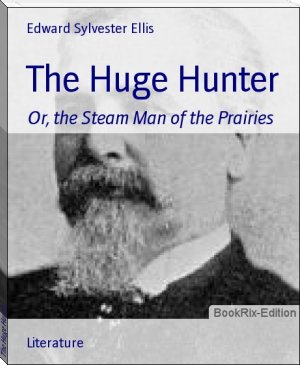The Life of Kit Carson: Hunter, Trapper, Guide, Indian Agent and Colonel U.S.A. by - (best motivational books to read TXT) 📗

- Author: -
Book online «The Life of Kit Carson: Hunter, Trapper, Guide, Indian Agent and Colonel U.S.A. by - (best motivational books to read TXT) 📗». Author -
"Tonight we had no shelter, but we made a large fire around the trunk of one of the huge pines; and covering the snow with small boughs, on which we spread our blankets, soon made ourselves comfortable. The night was very bright and clear, though the thermometer was only at 10 degrees. A strong wind which sprang up at sundown, made it intensely cold; and this was one of the bitterest nights during the journey.
"Two Indians joined our party here; and one of them, an old man, immediately began to harangue us, saying that ourselves and animals would perish in the snow; and that, if we would go back, he would show us another and a better way across the mountain. He spoke in a very loud voice, and there was a singular repetition of phrases and arrangement of words, which rendered his speech striking, and not unmusical.
"We had now begun to understand some words, and, with the aid of signs, easily comprehended the old man's simple ideas. 'Rock upon rock—rock upon rock—snow upon snow—snow upon snow,' said he; 'even if you get over the snow, you will not be able to get down from the mountains.' He made us the sign of precipices, and showed us how the feet of the horses would slip, and throw them off from the narrow trails led along their sides. Our Chinook, who comprehended even more readily than ourselves, and believed our situation hopeless, covered his head with his blanket, and began to weep and lament. 'I wanted to see the whites,' said he; 'I came away from my own people to see the whites, and I wouldn't care to die among them; but here'—and he looked around into the cold night and gloomy forest, and, drawing his blanket over his head, began again to lament.
"Seated around the tree, the fire illuminating the rocks and the tall boils of the pines round about, and the old Indian haranguing, we presented a group of very serious faces.
"February 5.—The night had been too cold to sleep, and we were up very early. Our guide was standing by the fire with all his finery on; and seeing him shiver in the cold, I threw on his shoulders one of my blankets. We missed him a few minutes afterwards, and never saw him again. He had deserted. His bad faith and treachery were in perfect keeping with the estimate of Indian character, which a long intercourse with this people had gradually forced upon my mind.
"While a portion of the camp were occupied in bringing up the baggage to this point, the remainder were busied in making sledges and snowshoes. I had determined to explore the mountain ahead, and the sledges were to be used in transporting the baggage.
"Crossing the open basin, in a march of about ten miles we reached the top of one of the peaks, to the left of the pass indicated by our guide. Far below us, dimmed by the distance, was a large, snowless valley, bounded on the western side, at the distance of about a hundred miles, by a low range of mountains, which Carson recognized with delight as the mountains bordering the coast. 'There,' said he, 'is the little mountain—it is fifteen years ago since I saw it; but I am just as sure as if I had seen it yesterday.' Between us, then, and this low coast range, was the valley of the Sacramento; and no one who had not accompanied us through the incidents of our life for the last few months, could realize the delight with which at last we looked down upon it. At the distance of apparently thirty miles beyond us were distinguished spots of prairie; and a dark line, which could be traced with the glass, was imagined to be the course of the river; but we were evidently at a great height above the valley, and between us and the plains extended miles of snowy fields and broken ridges of pine covered mountains.
"It was late in the day when we turned towards the camp; and it grew rapidly cold as it drew towards night. One of the men became fatigued and his feet began to freeze, and building a fire in the trunk of a dry old cedar, Mr. Fitzpatrick remained with him until his clothes could be dried, and he was in a condition to come on. After a day's march of twenty miles, we straggled into camp, one after another, at nightfall; the greater number excessively fatigued, only two of the party having ever travelled on snowshoes before.
"All our energies were now directed to getting our animals across the snow; and it was supposed that, after all the baggage had been drawn with the sleighs over the trail we had made, it would be sufficiently hard to bear our animals.
"At several places, between this point and the ridge, we had discovered some grassy spots, where the wind and sun had dispersed the snow from the sides of the hills, and these were to form resting place to support the animals for a night in their passage across. On our way across, we had set on fire several broken stumps and dried trees, to melt holes in the snow for the camp. Its general depth was five feet; but we passed over places where it was twenty feet deep, as shown by the trees.
"With one party drawing sleighs loaded with baggage, I advanced today about four miles along the trail, and encamped at the first grassy spot, where we expected to bring our horses. Mr. Fitzpatrick, with another party, remained behind, to form an intermediate station between us and the animals.
"Putting on our snowshoes, we spent the afternoon in exploring a road ahead. The glare of the snow, combined with great fatigue, had rendered many of the people nearly blind; but we were fortunate in having some black silk handkerchiefs, which, worn as veils, very much relieved the eye.
"In the evening I received a message from Mr. Fitzpatrick, acquainting me with the utter failure of his attempt to get our mules and horses over the snow—the half hidden trail had proved entirely too slight to support them, and they had broken through, and were plunging about or lying half buried in snow. He was occupied in endeavoring to get them back to his camp; and in the mean time sent to me for further instructions. I wrote to him to send the animals immediately back to their old pastures; and, after having made mauls and shovels, turn in all the strength of his party to open and beat a road through the snow, strengthening it with branches and boughs of the pines.
"February 12.—We made mauls, and worked hard at our end of the road all the day. The wind was high, but the sun bright, and the snow thawing. We worked down the face of the hill, to meet the people at the other end. Towards sundown it began to grow cold, and we shouldered our mauls, and trudged back to camp.
"February 13.—We continued to labor on the road; and in the course of the day had the satisfaction to see the people working down the face of the opposite hill, about three miles distant. During the morning we had the pleasure of a visit from Mr.





Comments (0)